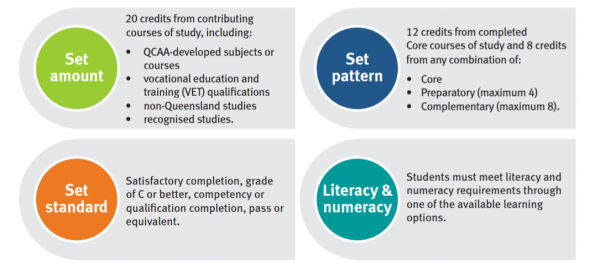Year 10 (the first year of the Senior School) is a transitional year. Students continue with both core and elective studies from Year 9 but also have the opportunity for extension or remediation according to their learning needs. This is in preparation for studies in Years 11 and 12.
This is Queensland’s senior secondary schooling qualification, which provides evidence of senior schooling achievements.
Most students will plan their QCE pathway in Year 10 when choosing their senior course of study.
To receive a QCE, students must achieve the set amount of learning, at the set, standard, in a set pattern, while meeting literacy and numeracy requirements.

The following link will provide you with a publication from QCAA on the QCE for students.
https://www.qcaa.qld.edu.au/downloads/senior/snr_new_assess_te_qce_factsheet_requirements.pdf
www.qtac.edu.auTo be eligible for an Australian Tertiary Admission Rank (ATAR) for the purposes of tertiary entrance students must select and study a set course of subjects as determined by the Queensland Tertiary Admissions Centre (QTAC). QTAC calculates ATARs based on either:
All students and parents should note that while most students enter tertiary courses using an ATAR, an ATAR is not necessary to gain entry into all courses at all tertiary institutions. For more information about tertiary entrance procedures please refer to QTAC’s website for the most current information: www.qtac.edu.au.
Year 10 (the first year of the Senior School) is a transitional year. Students continue with both core and elective studies from Year 9 but also have the opportunity for extension or remediation according to their learning needs. This is in preparation for studies in Years 11 and 12.
In this transitional year students continue and complete essential learnings with a focus on "filling gaps" and "building bridges" toward future studies and work. In Year 10 all core subjects are treated as discrete subject areas. The Year 10 core subject areas are:
Classes are not organised into ability groupings as has been the practice in the past. However, some choice is available in each core subject area with the exception of Religious Education to allow students to make the necessary transitions into relevant Senior subjects.
Students also have the opportunity to further refine their choices by selecting semester modules of particular interest for study in Year 10. Details of what is studied in each semester module are also included in the elective subject area descriptions in the Middle School Subject Selection Booklet. Elective modules may be changed as individual circumstances change.
During the course of Year 10, students are registered with the Queensland Curriculum and Assessment Authority (QCAA). Registration with the QCAA opens a Learning Account for the student. The registration process, in addition to gathering demographics, also collects information about the student’s intended learning pathway for their Senior Phase of Learning. Learning pathways after Year 10 are diverse and intended to equip students with options to take them into the next phase of their lives. These options may include studies that lead towards ATAR eligibility for university ranking, or vocational education to equip students with industry specific qualifications and skills. Students may avail of external learning opportunities such as school based apprenticeships, traineeships and TAFE that will also be recorded in student’s Learning Accounts.
Most students who study beyond Year 10 at Shalom College will work towards a Queensland Certificate of Education (QCE). The QCE accommodates all of the pathways listed above. A variety of possible pathways is outlined in the Senior Subject Selection Guide (below).
Year 11 and 12 students study Year 11 students study six subjects. Subjects selected must include an English subject, a Religion subject, and a Mathematics subject.
Opportunities to undertake Vocational Education and Training (VET) are available through school subjects offered at Shalom College.
An outline of the different subjects offered at Shalom College are found here - Curriculum Overview
Details of each senior subject are included in the Senior Subject Selection Guide, available to download on the Forms and Publications page.
Most students now progress to the end of twelve years of schooling. Success in the final two years is very important in opening up opportunities for further study or for employment. This success can only be attained by an appropriate selection of subjects, skilful time management, setting of priorities and conscientious application to study.
Obviously there will be many demands made on students' time during the next two years. Students will need to balance schoolwork with family commitments, possible part-time employment, recreation and other important activities. The successful student is inevitably the one who has clear and realistic goals, who has the support, encouragement and determination to achieve them and who manages time and priorities well.
In approaching Year 11, we would hope that parents have spoken to their son/daughter about the next two years. Expectations of the use of time, involvement in social functions, watching television, participation in extra-curricular activities (including sport) and doing an adequate amount of homework are all important points to discuss over and above subject choice.
Finally, whilst the prospect of subject selection can be the cause of some anxiety for students and parents it is important to maintain a sense of perspective. Decisions made at this time should not be seen as career channelling, life changing or character forming. Certainly, imprudent subject selection at this time could result in some inconvenience in the short-term future. However, there are many pathways to achieving personal goals and students and parents are encouraged to maintain a flexible and open mind to future possibilities.
Generally, students are advised to select subjects which they:
To proceed with subject selection: